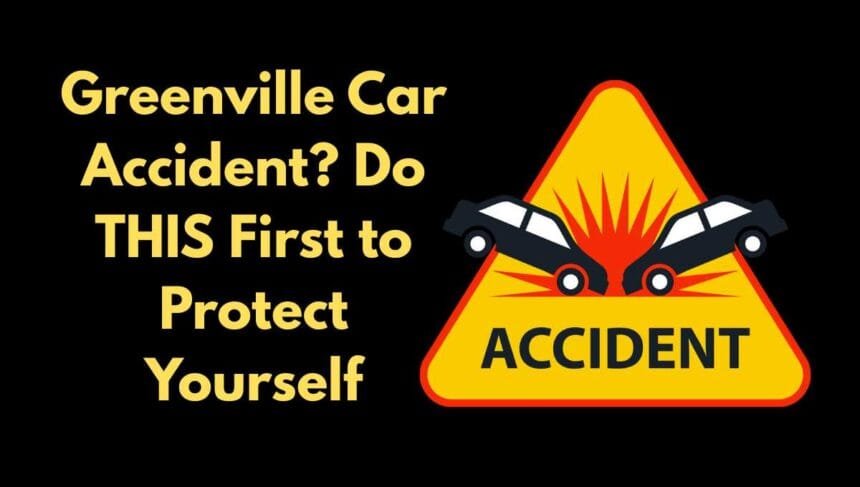The Crucial First Step: Ensure Safety and Call 911
1. Check for injuries and secure the scene
Immediately after the collision, assess your own health and that of passengers. Move carefully – avoid leaving the vehicle if anyone is seriously hurt, as doing so may worsen injuries.
If possible, turn on hazard lights and move to a safe shoulder or parking area. If you cannot move your vehicle due to damage or risk, stay in place until help arrives.
2. Call emergency services without delay
In Greenville and throughout South Carolina, the law requires reporting any accident resulting in injury, death, or over $1,000 in damage.
Dial 911 to summon police and, if needed, emergency medical assistance. Never assume someone else has called – stay on the line until dispatch confirms responders are en route.
Why This First Step Matters
Legal documentation:
Police presence ensures an official report is created, which is invaluable for any insurance claim or legal case later.
Medical evidence:
Conditions like whiplash, internal bleeding, and concussions often manifest hours or days later. Early assessment safeguards your health, and contemporaneous records strengthen injury claims.
Immediate safety control:
Securing the scene reduces your risk of further accidents – using hazard lights, reflective triangles, or flares helps protect you and emergency responders.
What to Do Next (Short-Term Follow‑Up)
1. Exchange Information
Once safety is assured and the police are notified, share details including:
- Your name, address, phone number
- Insurance provider and policy number
- Driver’s license and license plate number
- Vehicle make, model, and color
Do not admit fault or apologize – statements made in the moment can be used against you.
2. Document the Scene
Use your phone to:
- Photograph vehicle damage from multiple angles
- Capture the broader accident scene, road conditions, weather, skid marks, and traffic signals
- Record visible injuries and license plates
Take notes or sketches of the sequence of events while details are fresh. Collect witness names and contact details – they may prove critical later.
3. Obtain the Police Report
After officers arrive and file their report, ask for the attending officer’s name and badge number. Request a copy of the official crash report (South Carolina TR-310 form) for your records.
If police do not respond, South Carolina law requires you to file a crash report yourself within 15 days if there is bodily injury or more than $1,000 in property damage.
Health Comes First even if Pain Doesn’t Show Right Away
Visit a doctor promptly even if you feel fine. South Carolina’s comparative negligence law means your failure to seek timely treatment could be used to question the severity of your injuries .
Medical records are essential evidence. They help draw a direct line from the crash to any diagnosis.
Injuries like whiplash, back trauma, or concussions may only manifest later and go undocumented if you delay.
Inform Insurers but Be Cautious
Report the accident to your insurance company quickly – most require notification within 24 hours.
But don’t volunteer extra info. Limit your communication to basic facts. Decline recorded statements or quick settlements – when in doubt, refer inquiries to your lawyer.
Getting Legal Help: A Smart Next Step
You’re not required to hire a lawyer in Greenville, SC—but qualified personal injury attorneys bring many advantages. They can:
- Navigate complex insurance procedures
- Safeguard your rights (especially under comparative negligence)
- Handle lowball offers or inaccurate police reports
- Ensure critical deadlines aren’t missed.
Most personal injury lawyers operate on a contingency basis (no fee unless you’re compensated), which means you can seek counsel without upfront cost.
Summary Checklist
The absolute first action after a crash in Greenville is to check for injuries, secure the scene, and call 911. This ensures safety, legal compliance, and immediate care.
In the minutes that follow, take these practical steps:
| Step | Why It Matters |
|---|---|
| Call police & EMS | Legal compliance and medical documentation |
| Exchange info | Essential later for claims |
| Document the scene | Hard evidence to support your case |
| Seek medical help | Safeguard health and bolster legal claim |
| Notify insurance | Required by policy and kickstarts your claim |
| Consult a lawyer | Helps avoid pitfalls, handles insurers, maximizes compensation |



